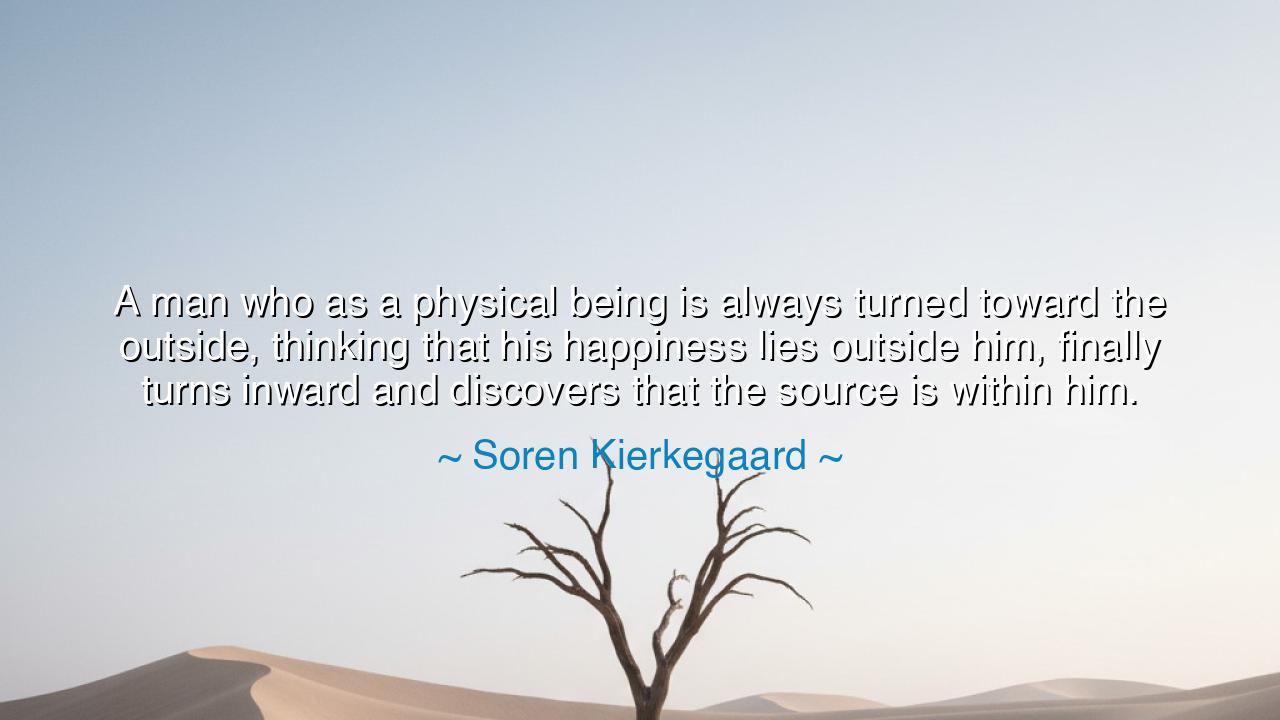
A man who as a physical being is always turned toward the
A man who as a physical being is always turned toward the outside, thinking that his happiness lies outside him, finally turns inward and discovers that the source is within him.






The Danish philosopher Søren Kierkegaard, often called the father of existentialism, once wrote, “A man who as a physical being is always turned toward the outside, thinking that his happiness lies outside him, finally turns inward and discovers that the source is within him.” In this profound reflection lies a truth as old as the human soul — that happiness cannot be found in the glittering illusions of the outer world, but only in the quiet, untapped depth of the inner self. Kierkegaard, who wrestled deeply with questions of faith, despair, and meaning, teaches here that man’s greatest tragedy is his endless search for fulfillment in what he can see, touch, and possess — while the greatest miracle is the moment he realizes that what he sought was within him all along.
Born in nineteenth-century Denmark, Kierkegaard lived in a society that prized conformity and external success, much as ours does today. Yet he was a man apart — a soul burning with questions that the outer world could not answer. He saw how people filled their lives with noise, wealth, status, and distraction, all in pursuit of a happiness that forever escaped them. He believed that man, as a physical being, is tempted to turn outward, to seek validation in others’ eyes, to chase after pleasures and possessions. But such happiness is fragile; it vanishes when fortune changes or admiration fades. True joy, he realized, comes only when a man turns inward — when he confronts himself honestly, and finds peace not in the approval of the world, but in the harmony of his soul with truth.
Kierkegaard’s insight was not born in comfort, but in suffering and solitude. He lost his father at a young age, broke off his engagement to the woman he loved, and lived as an exile within his own society. Yet through his pain, he discovered something radiant: that when the outer world fails, the inner world awakens. “The source is within him,” he wrote — meaning that man’s truest strength and joy arise when he anchors himself not in fleeting pleasures, but in eternal values — faith, integrity, and self-knowledge. Inwardness, to Kierkegaard, was not retreat or isolation, but the return to what is most real — the divine spark that dwells within every soul.
The ancients, too, understood this secret. Marcus Aurelius, the Roman emperor and philosopher, wrote in his Meditations: “Nowhere can man find a quieter or more untroubled retreat than in his own soul.” He ruled armies, commanded wealth, and wore the crown of the world — yet he knew that peace could not be conquered by empire, only discovered in the heart. In his palace, surrounded by power and turmoil, Marcus turned inward, writing words that still teach us today: that serenity is not the absence of chaos, but the mastery of self amid chaos. So too did Kierkegaard proclaim that happiness does not depend on circumstance, but on one’s relation to oneself — to that quiet, eternal core within where truth resides.
This turning inward does not mean abandoning the world, but seeing it anew. For when a man discovers the light within, he no longer seeks the world’s gifts to complete him; he gives to the world from his completeness. His joy is not borrowed from praise or success, but radiates from a heart aligned with truth. Consider the life of Mahatma Gandhi, who turned away from worldly comfort to follow the voice of conscience. Though he faced imprisonment, humiliation, and hardship, his inner strength never wavered. For his happiness was not chained to victory, but to the quiet certainty that he was living in accordance with his deepest truth. Like Kierkegaard’s ideal man, Gandhi found that the kingdom of peace is within — and from that inner kingdom, he transformed the outer world.
Kierkegaard’s teaching, then, is a call to every soul that feels lost in the noise of modern life. The man who forever looks outward — comparing, competing, consuming — becomes enslaved to the world’s mirages. But when he dares to look within, he discovers a wellspring of peace that no loss can drain and no hardship can destroy. It is there, in the stillness of the heart, that he meets himself — and in meeting himself, he meets the divine. The journey inward is the journey home.
So, my child, take this wisdom to heart. Do not look for happiness in the eyes of others, nor in possessions that fade, nor in triumphs that pass. Instead, cultivate the inner garden of your spirit. Spend time in silence, reflect upon your deeds, listen for the voice of conscience and of truth. When you find harmony within, the outer world will cease to trouble you, for your joy will flow from a deeper source. As Kierkegaard teaches, the man who turns inward discovers that he needs nothing more than what already lies within — the eternal well of peace, purpose, and light. For when the soul learns to dwell in its own truth, happiness is no longer a pursuit — it becomes one’s very nature.






AAdministratorAdministrator
Welcome, honored guests. Please leave a comment, we will respond soon